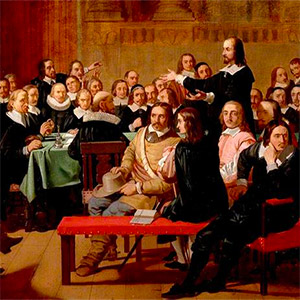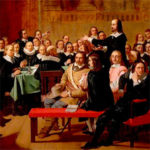
Quotes by Westminster Divines
The whole counsel of God, concerning all things necessary for His own glory, man’s salvation, faith and life, is either expressly set down in Scripture, or by good and necessary consequence may be deduced from Scripture: unto which nothing at any time is to be added, whether by new revelations of the Spirit, or traditions of men.
God from all eternity, did, by the most wise and holy counsel of His own will, freely, and unchangeably ordain whatsoever comes to pass yet so, as thereby neither is God the author of sin, nor is violence offered to the will of the creatures; nor is the liberty or contingency of second causes taken away, but rather established.
In the case of adultery after marriage, it is lawful for the innocent party to sue out a divorce, and after the divorce to marry another, as if the offending party were dead.
Repentance unto life is a saving grace, whereby a sinner, out of true sense of his sin, and appreciation of the mercy of God in Christ, doth, with grief and hatred of sin, turn from it unto God, with full purpose of, and endeavor after, new obedience.
Justification is an act of God’s grace wherein He pardons all our sins and accepts us as righteous in His sight only for the righteousness of Christ imputed to us and received by faith alone.
The purest churches under heaven are subject both to mixture and error; and some have so degenerated, as to become no churches of Christ, but synagogues of Satan. Nevertheless, there shall be always a church on earth, to worship God according to His will.
The supreme judge by which all controversies are to be determined, and all decrees of councils, opinions of ancient writers, doctrines of men, and private spirits, are to be examined, and in whose sentence we are to rest, can be no other but the Holy Spirit speaking in the Scripture.
God from all eternity, did, by the most wise and holy counsel of His own will, freely, and unchangeably ordain whatsoever comes to pass; yet so, as thereby neither is God the author of sin, nor is violence offered to the will of the creatures; nor is the liberty or contingency of second causes taken away, but rather established.
[B]elievers being accepted through Christ, their good works are accepted in Him; not as though they were in this life wholly unblameable and unreprovable in God’s sight; but that He, looking upon them in His Son, is pleased to accept and reward that which is sincere, although accompanied with many weaknesses and imperfections.
Repentance unto life is a saving grace, whereby a sinner, out of true sense of his sin [intellectual aspect], and appreciation of the mercy of God in Christ, doth, with grief and hatred of sin [emotional aspect], turn from it unto God, with full purpose of, and endeavor after, new obedience [volitional aspect].
God freely justifies the persons whom he effectually calls. He does this, not by infusing righteousness into them but by pardoning their sins and by accounting them, and accepting them as righteous. This He does for Christ’s sake alone and not for anything wrought in them or done by them. The righteousness which is imputed to them, that is, reckoned to their account, is neither their faith nor the act of believing nor any obedience to the gospel which they have rendered, but Christ’s obedience alone. Christ’s one obedience is twofold – His active obedience rendered to the entire divine law, and His passive obedience rendered in his death.
